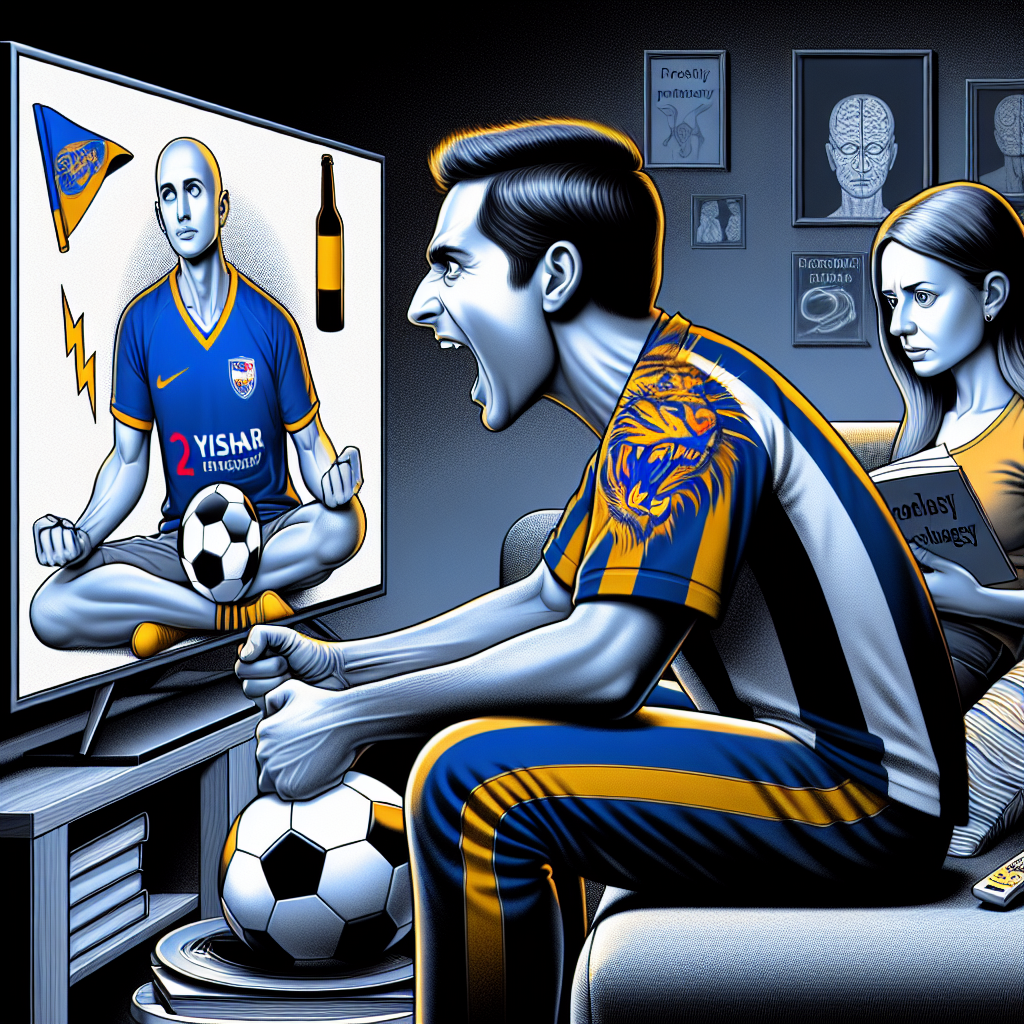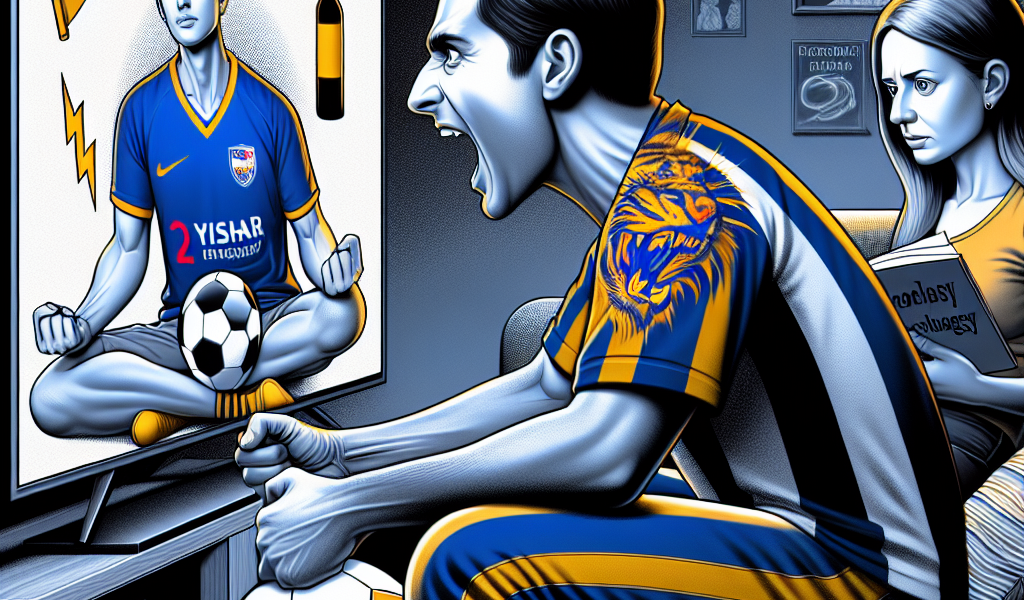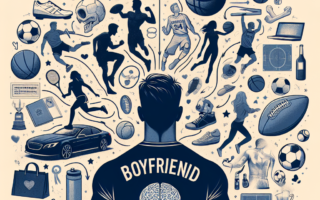Do you ever find yourself wondering why your boyfriend becomes so completely engrossed in sports teams? It’s a phenomenon that many women can relate to – the seemingly unbreakable bond between men and their sporting heroes. From the pre-game rituals to the nail-biting moments of a match, it can be perplexing to understand why sports teams hold such a grip on their male counterparts. In this article, we will explore some of the reasons behind this obsession, shedding light on the psychology and emotions that drive it. So, if you’ve ever found yourself questioning why your boyfriend’s love for sports goes beyond mere fandom, keep reading to uncover the answer.
Understanding the Psychology of Sports Fandom
The appeal of being part of a community
Being a sports fan offers a unique sense of belonging and community. It provides an opportunity to connect with like-minded individuals who share the same passion and enthusiasm for a particular team. The sense of being part of a larger community of fans creates a sense of camaraderie and fosters a feeling of belonging. It allows individuals to feel understood, valued, and accepted, contributing to a fulfilling social experience.
The emotional connection to a team
Sports fandom often involves a deep emotional connection to a specific team. Fans invest their time, energy, and emotions into following their favorite team, which can lead to a strong sense of loyalty and attachment. This emotional connection can stem from various factors, such as childhood memories, personal experiences, or a shared history with the team. The ups and downs of a team’s performance can evoke intense emotions, including joy, disappointment, and even grief, further strengthening the emotional bond between fans and their team.
The fulfillment of social needs
Humans are social beings, and sports fandom satisfies the basic human need for social interaction and connection. Being part of a sports fan community allows individuals to fulfill their social needs by providing opportunities for socializing, bonding, and engaging in shared experiences. Attending games, watching matches together, or discussing team strategies with fellow fans fosters social connections and builds relationships. This social aspect of sports fandom helps individuals feel supported, connected, and part of a larger social fabric.
The Role of Identity and Belonging in Sports Fandom
Expression of personal identity
For many sports fans, their fandom serves as a means of self-expression and personal identity. Supporting a particular team can be a reflection of one’s values, beliefs, and interests. Fandom allows individuals to showcase their passion and dedication to their team, signaling their identity to others. The apparel they wear, the flags they wave, and the rituals they engage in all contribute to the expression of their personal identity.
Group affiliation and belonging
Sports fandom provides a platform for individuals to affiliate themselves with a specific group or community. The collective identity created through supporting a team allows fans to feel a sense of belonging and camaraderie. This group affiliation can provide a sense of solidarity, support, and shared experiences. Being part of a fan community fosters a feeling of togetherness and can strengthen social bonds among individuals who may not have otherwise connected.
Enhancing self-esteem and validation
Identifying with a successful sports team can boost an individual’s self-esteem and sense of validation. When a team achieves success, fans often associate themselves with that success, feeling a sense of pride and accomplishment. This affiliation can enhance an individual’s self-worth and provide a source of validation. Being part of a successful team’s fanbase may also lead to admiration and recognition from others, further contributing to an individual’s self-esteem.

The Influence of Childhood and Upbringing
Family and parental influence
Childhood experiences and upbringing play a significant role in shaping an individual’s sports fandom. Oftentimes, the sports teams an individual supports are passed down from generation to generation within a family. This familial influence can create a sense of tradition and reinforce the emotional connection to a team. The memories of watching games with family members and experiencing the highs and lows of a team’s performance can leave a lasting impact on an individual’s sports fandom.
Early exposure to sports
Early exposure to sports can heavily influence an individual’s sports fandom. Whether through playing sports themselves or watching games with family and friends, these early experiences can create a foundation for a lifelong passion for a specific team. The nostalgia associated with these early memories and the positive emotions experienced during these formative years can solidify a fan’s loyalty and attachment to a particular team.
Cultural and societal factors
Cultural and societal factors also play a role in shaping an individual’s sports fandom. In some cultures, certain sports are woven into the fabric of society, and supporting a specific team is a shared norm. Societal expectations, such as attending games or following a team, can influence an individual’s sports preferences. Additionally, factors like regional pride, national identity, or local community engagement can shape a person’s sports fandom, as they gravitate towards teams that represent their cultural or societal affiliations.
The Impact of Peer Pressure and Social Environment
Desire for social acceptance
Peer pressure and the desire for social acceptance can heavily impact an individual’s sports fandom. When faced with the influence and opinions of friends, colleagues, or social circles, individuals may feel compelled to support a particular team to fit in or avoid social exclusion. The fear of being left out or considered an outsider can sway an individual’s sports preferences and lead them to align with popular or socially accepted teams.
Societal norms and expectations
Societal norms and expectations can also shape an individual’s sports fandom. The perceived importance of sports within a society or community can influence what teams individuals choose to support. In some cultures, certain sports are held in high regard, and supporting a particular team is seen as an integral part of social integration. Adhering to these societal norms and expectations can lead individuals to develop a genuine interest in sports and become deeply involved in a specific team’s fandom.
Influence from friends and social circles
The influence of friends and social circles cannot be underestimated when it comes to shaping an individual’s sports fandom. Friends often play a vital role in introducing new sports interests, discussing games, and fostering a sense of belonging within a fan community. Through shared experiences and camaraderie, friends can shape and reinforce an individual’s attachment to a team. The sense of connection and enjoyment derived from discussing and attending games with friends can deepen one’s sports fandom.
The Role of Competition and Achievement
Thrill of competition
Competition is a fundamental aspect of sports fandom that captivates many fans. The thrill of witnessing highly skilled athletes competing against each other in intense matches creates a sense of excitement and engagement. Fans find joy and entertainment in the unpredictability and drama of competition, fueling their passion for their team. The adrenaline rush and emotional highs that come with closely contested games or fierce rivalries can be addictive, making sports fandom a thrilling experience.
The pursuit of excellence
Sports fandom often involves a fascination with excellence and the quest for perfection. Fans admire the dedication, talent, and determination of athletes who strive to be the best in their respective sports. The pursuit of excellence resonates with individuals who appreciate hard work and achievement, and supporting a successful team allows fans to bask in the glory of their accomplishments. The pursuit of excellence can inspire and motivate fans to set high standards for themselves in their own lives.
Success and failure as emotional triggers
Success and failure experienced by a team can have a profound impact on the emotions of sports fans. The joy and elation felt when a team wins a championship or achieves success can create a sense of euphoria among fans. On the other hand, the disappointment, frustration, and sadness that accompany a team’s failures can provoke intense emotions. These emotional triggers strengthen the bond between fans and their teams, as they navigate the rollercoaster of emotions together.
The Power of Rituals and Superstitions
Rituals as a source of comfort
Rituals play a significant role in sports fandom, providing a sense of comfort and familiarity. From pre-game rituals to wearing lucky clothing, these practices create a feeling of control and routine in the unpredictable world of sports. Engaging in rituals before or during games can offer fans a sense of reassurance and a way to connect with their team on a deeper level. Rituals provide a comforting structure and give fans a sense of involvement and influence over the outcome of a game.
Superstitions as a way to control outcomes
Superstitions are prevalent in sports fandom and often stem from the desire to have some control over the outcome of a game. Fans may engage in superstitious behaviors, such as wearing the same clothes or sitting in the same seat for every game, in the hope that it will bring luck to their team. While superstitions may seem irrational, they serve as a psychological mechanism to cope with the uncertainty and unpredictability of sports. By performing these rituals, fans feel like they have a direct impact on their team’s success.
Psychological impact of rituals and superstitions
Rituals and superstitions can have a significant psychological impact on sports fans. Engaging in these practices creates a sense of unity and shared experience among fans. It fosters a feeling of being part of something greater and provides a sense of psychological comfort and stability. The repetition of rituals and adherence to superstitions can provide a sense of control and alleviate anxiety, allowing fans to fully enjoy the game and experience a deeper emotional connection to their team.

Sports as Entertainment and Escapism
Sports as a form of entertainment
Sports fandom is deeply rooted in the entertainment value that sports provide. Watching games, following leagues, and being immersed in the world of sports offers a source of enjoyment and excitement. Sports serve as a form of entertainment that caters to a wide range of interests, from the athleticism and skills displayed by athletes to the suspense and drama of competitive matches. The entertainment factor of sports draws individuals in and keeps them engaged and enthralled in their favorite teams’ pursuits.
Distraction from daily life and stress
For many fans, sports offer an escape from the pressures and stressors of daily life. Watching or participating in sports provides a welcome diversion, allowing individuals to momentarily disconnect from their worries and responsibilities. Sports fandom can provide a mental break, a chance to unwind, and a way to recharge. The immersive and captivating nature of sports allows individuals to focus on something outside of their own lives, providing a much-needed respite from the demands of everyday life.
Emotional release and catharsis
Sports fandom provides a platform for emotional release and catharsis. The emotional investment in a team’s performance allows fans to express and experience a wide range of emotions. Whether it’s celebrating a victory or grieving a loss, fans can release pent-up emotions in a safe and constructive manner. The collective experience of sharing these emotions with fellow fans can be cathartic, providing a sense of unity and comfort in knowing that others are experiencing similar emotions.
The Influence of Media and Advertising
Hype and marketing strategies
Media and advertising play a significant role in shaping sports fandom. The hype created by media outlets and marketing campaigns can influence fans’ perceptions and generate excitement. Attention-grabbing headlines, highlight reels, and promotional events generate buzz and capture the attention of fans. Media coverage and strategic marketing strategies contribute to the narrative and mythos surrounding teams and athletes, fueling fans’ enthusiasm and interest in supporting them.
Promotion of team loyalty
Media and advertising efforts often aim to promote team loyalty among fans. Through various mediums, such as commercials, merchandise, and branding initiatives, teams and organizations attempt to build a strong fan base and cultivate a sense of loyalty. The portrayal of teams as more than just groups of athletes creates a sense of connection and identification among fans. By aligning themselves with a particular team, fans demonstrate their loyalty and commitment, which can be reinforced through targeted media messaging.
Media portrayal of sports heroes
Media plays a crucial role in shaping sports heroes and influencing fans’ perceptions of these athletes. The portrayal of athletes through media coverage, interviews, and documentaries contributes to the construction of fan narratives and the creation of sports heroes. The stories of athletes overcoming adversity, displaying exceptional skills, and embodying desirable qualities can inspire and captivate fans. Media exposure can elevate athletes to iconic status and cement their place in fans’ hearts, further fueling their devotion to a particular team.

The Role of Team Success and Fan Loyalty
Connection to a winning team
The success of a sports team often plays a significant role in the loyalty and attachment fans develop. Supporting a winning team can create a sense of pride and accomplishment, as fans bask in the glory of their team’s victories. The emotional highs experienced during successful campaigns forge a deeper bond between fans and their teams. The feeling of shared triumph instills a sense of belonging and reinforces fans’ loyalty, as they associate themselves with a team that consistently achieves success.
Hopes and dreams tied to team performance
Fans often invest their hopes and dreams in the performance of their favorite team. A team’s success or failure can impact fans’ mood, morale, and even their outlook on life. For some fans, supporting a team becomes intertwined with personal aspirations and dreams. The accomplishments or failures of a team can influence fans’ perception of their own lives and can provide inspiration or disappointment. The emotional investment in a team’s success brings fans on a rollercoaster ride of emotions, as their own hopes and dreams are attached to their team’s performance.
Loyalty despite ups and downs
Fan loyalty is often unwavering, regardless of a team’s performance. Even during periods of disappointment or failure, devoted fans remain loyal and committed. This loyalty goes beyond a team’s win-loss record and extends to the emotional connection and shared history fans have with their team. The support and dedication exhibited by fans during challenging times demonstrates the strength of their commitment and reveals the deep emotional bond they have developed. Through thick and thin, fans remain loyal, standing by their team’s side.
Exploring the Dark Side: Obsession vs. Addiction
Differentiating between enthusiasm and obsession
While sports fandom is generally a source of enjoyment, it is essential to recognize the difference between healthy enthusiasm and unhealthy obsession. Enthusiasm involves being passionate and invested in a team without it adversely affecting one’s well-being or relationships. On the other hand, obsession involves an intense preoccupation with a team that may interfere with daily life, personal relationships, and overall mental health. It is crucial to monitor one’s level of engagement and ensure that sports fan behavior remains balanced and healthy.
Signs of unhealthy obsession
Unhealthy obsession with sports fandom may manifest in various ways. Signs to watch out for include neglecting personal responsibilities, sacrificing important relationships for the sake of following a team, experiencing distress when unable to engage in sports-related activities, and losing interest in other aspects of life that were once enjoyable. If the passion for sports becomes all-consuming and starts to detrimentally impact one’s well-being, seeking professional help and support is essential.
Understanding addictive behavior
Addictive behavior related to sports fandom can be challenging to recognize but is worth understanding. Sports fandom can trigger the release of dopamine in the brain, which creates a pleasurable sensation. In some cases, individuals may become addicted to this pleasurable feeling, leading to excessive preoccupation with their team and a compulsive need to engage in sports-related activities. Understanding the underlying psychological and neurological factors contributing to addictive behavior can help individuals recognize when their sports fandom has crossed the line into an unhealthy addiction.
Sports fandom is a complex psychological phenomenon that encompasses various aspects of identity, belonging, emotions, and social dynamics. By understanding the psychology behind sports fandom, we can gain insight into why individuals become so deeply attached to their teams and why sports can evoke such intense emotions. As fans, it is essential to strike a balance between enjoyment and healthy engagement, recognizing the signs of unhealthy obsession or addiction and seeking support when needed. Ultimately, sports fandom should be a source of joy, connection, and entertainment that adds value to our lives.








